By: Ray Day
CONTACT:
We wanted to share our latest consumer and business insights, based on research from Stagwell. Among the highlights of our weekly consumer sentiment tracking:
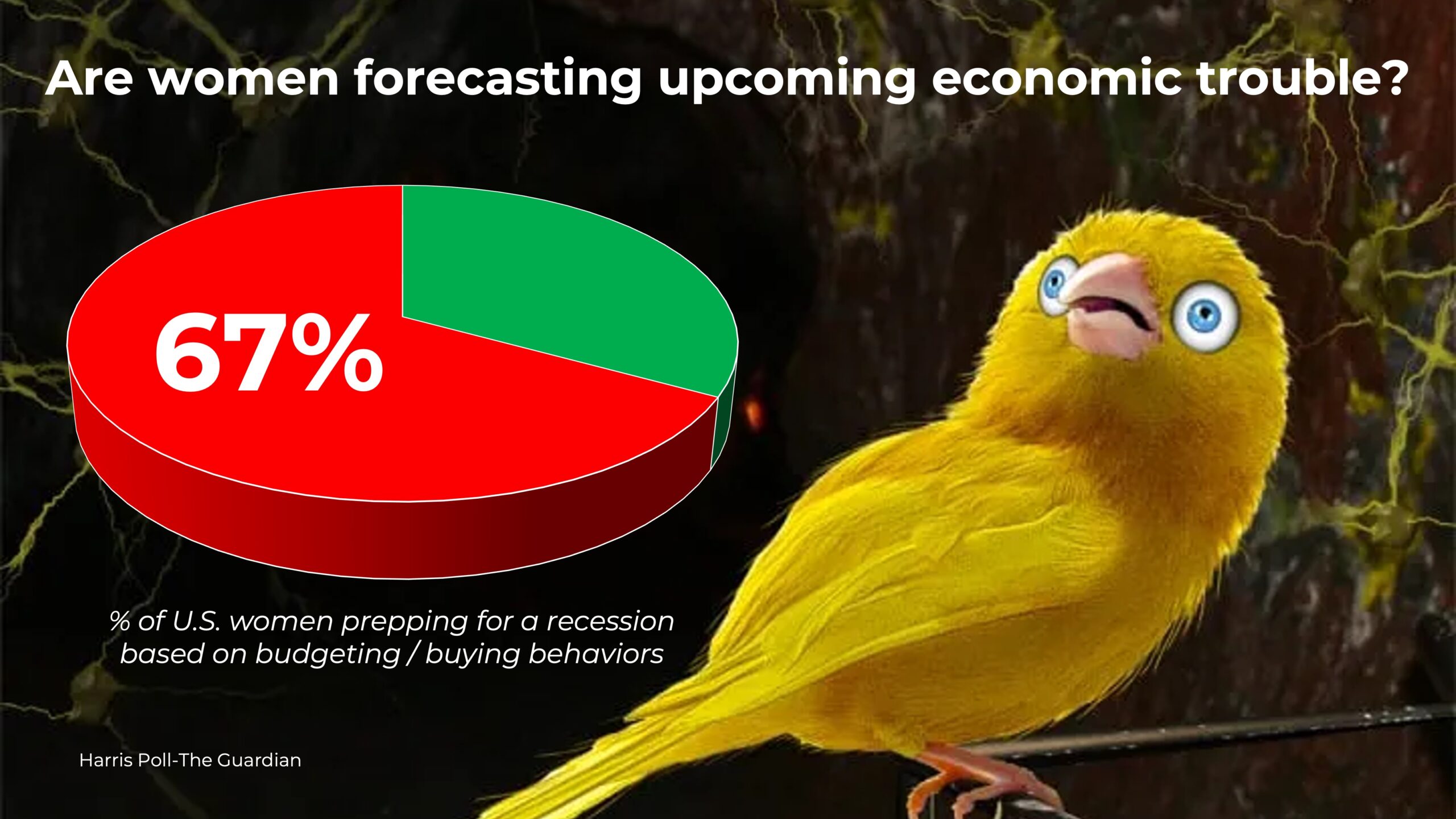
FEMALE CANARIES IN THE COAL MINE?
Two thirds of American women today are adjusting their budgeting and shopping in preparation for a recession, based on our Harris Poll research with The Guardian.
- More women than men (62% of women versus 48% of men) are cutting back on their discretionary spending, switching to lower-cost brands (56% versus 45%) and entering “low-buy mode” (46% versus 39%) in anticipation of an economic slow-down.
- Women are significantly more concerned about overall economic uncertainty than men (83% for women versus 73% for men).
- 62% of women say the economy is worsening, versus 47% of men.
- 70% of Gen Z women say their financial health is all they think about today.
- Women also are 13 percentage points more likely to be shoring up their emergency funds than men (76% versus 63%).
- Women in relationships report being primarily responsible for their household’s shopping (70%) and tracking household expenses (59%).
AI-LITERATE HELP WANTED
In a world of AI, which skills are needed in the workplace? The Harris Poll’s new 2025 ETS Human Progress Report: HR Edition gives an inside glimpse into how HR leaders will assess tomorrow’s talent.
- 67% of HR decision-makers say AI literacy is an essential skill for new hires, yet only 39% of U.S. employees report being proficient in this area.
- At the same time, only 24% of employees in the U.S., UK and France have access to AI coaching for personalized skills development – compared with 53% who have such a benefit in India and 30% in China.
- 70% of employees would trust an AI coach to help them identify skills they need to learn to accelerate their careers.
- 90% of chief human resources officers say their organization is finding the need to hire outside the standard four-year college degree.
- 86% of HR decision-makers say focusing on college degrees as an employment filter is a dated practice, leaving talent on the table.
- The key challenges for HR decision makers are verifying skill sets (73%) and upskilling and reskilling employees (70%).
- 86% of employees say certifying their skills improves their overall career trajectory.
- 6 in 10 expect a world of verified resumes and digital skill wallets to showcase their value to the market.
PICK UP THE PHONE!
Most Americans will forego restaurants that do not answer their phones, according to our Harris Poll research with Hostie.
- 63% of Americans say calling is their preferred way to contact a restaurant.
- 58% of calls to restaurants go unanswered.
- 69% say they’re likely to give up on going to a restaurant if no one answers the phone (72% for Millennials).
- Other methods of communication include speaking with staff in person (34%), using reservation apps (30%) and messaging via a restaurant’s website (29%).
- 89% would be open to using an AI agent – versus a live person – for making a reservation (47%), tracking an order or checking wait times/availability (42%), searching for special offers (39%) and placing a pickup or delivery order (38%).
AMERICANS NEED HELP, BUT STRUGGLE TO GET IT
Americans are feeling overwhelmed by the pressures of daily life, yet they don’t feel they can ask for help, according to our Harris Poll research with Duckbill.
- 64% of Americans are just trying to get through the day, instead of enjoying it.
- 67% of young adults ages 18-34 say time feels like a luxury they can’t afford (74% for women in the same age group).
- 22% say they avoid or procrastinate scheduling their own doctor’s appointments (31% of women ages 18-34).
- 48% say they feel they should be able to handle things themselves.
- 47% of women say they don’t want to burden others by asking for help.
HITTING THE ROAD
Despite economic pressures, Americans are traveling more this summer than last, according to our Harris Poll report with the Out of Home Advertising Association of America.
- 83% of Americans plan to travel for leisure this year (90% of Gen Z).
- 1 in 4 travelers say they will spend more this year than last summer.
- In the past week, 79% rode in a car and 58% walked in a city or downtown area.
- 4 in 10 say they are driving more today than before the pandemic.
- Most will take about nine days off, and more than one in five are planning two weeks or more.
- See also: What’s next in travel and communications?
ICYMI: In case you missed it, check out the thought-leadership and happenings around Stagwell making news:
Newsletter
Sign Up
Related
Articles
Weekly Data
Jul 10, 2025
WHAT THE DATA SAY: 62% of women say the economy is worsening, versus 47% of men

In the News, Press Releases
Jul 09, 2025
STAGWELL LAUNCHES STAGWELL MEDIA PLATFORM (SMP), A CENTRALIZED TEAM OF GLOBAL MEDIA, TECHNOLOGY AND DATA INVESTMENT EXPERTS

In the News, Investments & Financials, Press Releases
Jul 08, 2025
Stagwell (STGW) Schedules Webcast to Discuss Financial Results for the Three Months Ended June 30, 2025

By: Ray Day
CONTACT:
We wanted to share our latest consumer and business insights, based on research from Stagwell. Among the highlights of our weekly consumer sentiment tracking:
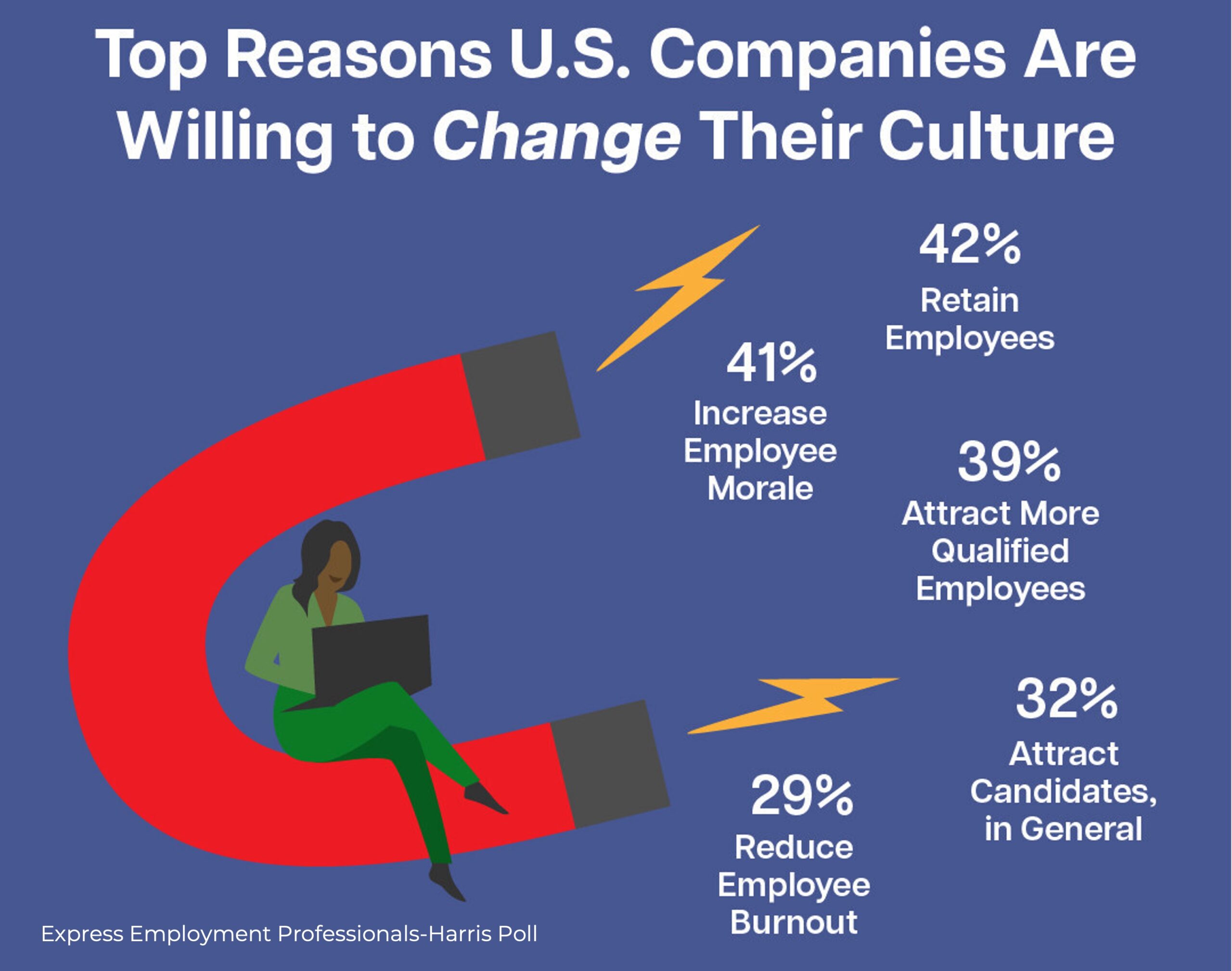
FITTING IN
While most hiring managers want new hires to fit with an existing company culture, many are growing more open to adapting to a more modern era, according to our Harris Poll research with Express Employment Professionals.
- 44% of employees say it’s time for company culture to evolve with the times (59% of women and 49% of men).
- 84% of hiring managers say their organization is open to changing its culture to meet business needs.
- Top reasons for changing company culture include: retaining current employees (42%), boosting morale across the board (41%), attracting more qualified candidates (39%) and broadening their appeal to job seekers in general (32%).
AI ADVANTAGE
As AI becomes increasingly popular in the modern workplace, Gen Z stands out as the top adopters, according to our Harris Poll research with UKG.
- 70% of Gen Z employees say they’ve taught themselves most of the AI tools they use at work (58% of Gen X and 40% of Boomers).
- 49% say their bosses don’t understand the benefits of AI.
- 89% feel AI should be viewed as a tool, not a co-worker.
- AI appropriate tasks include highly repetitive or routine responsibilities (49%), data-intensive duties (42%), time-consuming tasks (38%), tasks that require little judgment, empathy or nuance (35%), and tasks that are often prone to human error (34%).
- 79% believe AI tools could free up time to focus on more important or rewarding parts of their jobs (90% for Gen Z).
SUMMER BLUES
Younger Americans are relying on a variety of mostly online tactics to combat emotional overwhelm, according to our Harris Poll survey with Naropa University.
- 68% of Gen Z agree they often put other people’s emotional needs ahead of their own.
- 61% say they don’t know where to turn when they feel emotionally overwhelmed.
- 63% of Gen Z and Millennials find mental health information on social media (compared with 43% of Gen X and 18% of Boomers).
- Gen Z coping tactics include listening to music (64%), binge watching TV (47%), doomscrolling (29%) and retail therapy (27%).
DELIVERY NOT INCLUDED
Most Americans now prefer to buy big-ticket items in-store rather than risk receiving them via unsafe delivery, based on our Harris Poll research with Position Imaging.
- 70% of Americans buy big items in-store due to delivery concerns.
- 68% of apartment residents would shop more online with secure delivery rooms.
- More than 80% of younger buyers are speeding up purchases to avoid tariffs and shortages.
ICYMI: In case you missed it, check out the thought-leadership and happenings around Stagwell making news:
Newsletter
Sign Up
Related
Articles
Weekly Data
Jul 10, 2025
WHAT THE DATA SAY: 62% of women say the economy is worsening, versus 47% of men

In the News, Press Releases
Jul 09, 2025
STAGWELL LAUNCHES STAGWELL MEDIA PLATFORM (SMP), A CENTRALIZED TEAM OF GLOBAL MEDIA, TECHNOLOGY AND DATA INVESTMENT EXPERTS

In the News, Investments & Financials, Press Releases
Jul 08, 2025
Stagwell (STGW) Schedules Webcast to Discuss Financial Results for the Three Months Ended June 30, 2025

By: Ray Day
CONTACT:
We wanted to share our latest consumer and business insights, based on research from Stagwell. Among the highlights of our weekly consumer sentiment tracking:

THE TOLL OF STUDENT LOANS
The burden of student loans affects much more than just borrowers’ credit scores, according to our Harris Poll report with Credit Karma.
- 7 million Credit Karma members with federal student loans are delinquent.
- 58% say that their student loan debt is the biggest financial stressor that they face today.
- 44% estimate to have more than $50,000 in federal student loan debt.
- 72% say their credit score has declined as a result of being delinquent.
- 68% who are delinquent or in default on their loans say their current income is not sufficient to cover both their living expenses and student loan payments.
- 25% say they’ve been threatened to have their wages or government benefits garnished because of unpaid student loan debt.
- 67% of those who are delinquent or in default say it has caused them significant anxiety and/or depression.
- 91% are taking steps to make payments: taking on additional work to increase income (32%), decreasing non-essential spending (30%), applying for an income-driven repayment (28%) and applying for forbearance or deferment (25%) are the top steps.
SIDE HUSTLE CULTURE
More workers are looking for additional sources of income to combat financial anxiety, according to our Harris Poll survey with the American Staffing Association.
- 64% of workers say they’re likely to get a second job or side hustle in the next year.
- 75% of workers with children said they were likely to seek additional work (55% without children).
- 28% of workers who rent said they’d have less than a month of savings as a financial cushion (14% for homeowners).
- 19% said their savings could cover less than a month of expenses.
TRENDS OF GEN Z
Gen Z shoppers are trend-driven, embracing social media and AI tools, according to our Harris Poll survey by QuestDIY.
- 40% of Gen Z shoppers report buying new products based on trends.
- 33% participated in live shopping events on social media.
- 21% relied on AI-powered product recommendations.
- 33% used chatbots for customer service.
- 27% shopped using voice assistants.
- 33% are willing to pay 5-10% more for sustainable products.
ICYMI: In case you missed it, check out the thought-leadership and happenings around Stagwell making news:
- The Harris Poll and Quad: The Return of Touch Report
- New Madison Logic Survey By Harris Poll Finds 96% of B2B Marketing Leaders Polled Are Changing Their Marketing Strategies Due to the Current Economic Climate
- The PR Week Podcast: Jonathan Heit, Allison
- Mondelēz leverages Harris Poll insights to lead the conversation in snacking
- Decoding the Paradoxes of Trust
- Cannes Lions 2025 takeaways and insights from ad executives
Newsletter
Sign Up
Related
Articles
Weekly Data
Jul 10, 2025
WHAT THE DATA SAY: 62% of women say the economy is worsening, versus 47% of men

In the News, Press Releases
Jul 09, 2025
STAGWELL LAUNCHES STAGWELL MEDIA PLATFORM (SMP), A CENTRALIZED TEAM OF GLOBAL MEDIA, TECHNOLOGY AND DATA INVESTMENT EXPERTS

In the News, Investments & Financials, Press Releases
Jul 08, 2025
Stagwell (STGW) Schedules Webcast to Discuss Financial Results for the Three Months Ended June 30, 2025

By: Ray Day
CONTACT:
We wanted to share our latest consumer and business insights, based on research from Stagwell. Among the highlights of our weekly consumer sentiment tracking:
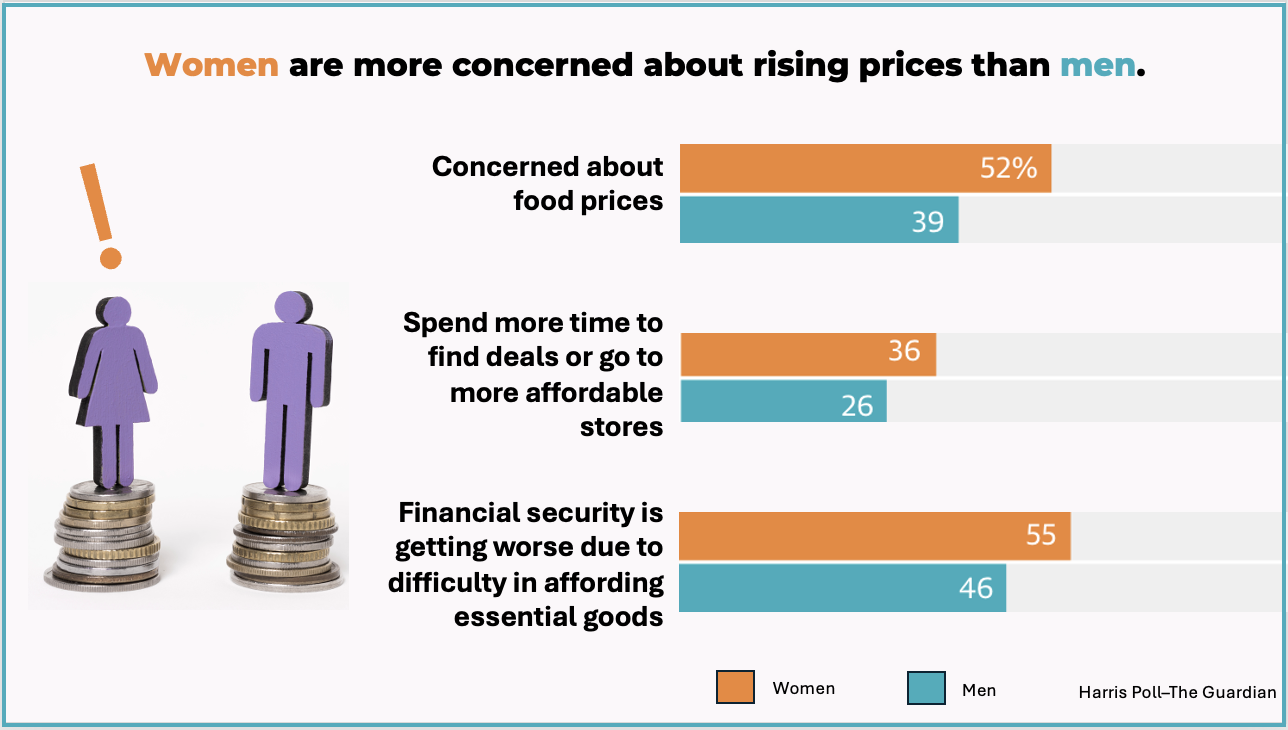
WORRIED WOMEN
Women are feeling the financial strain of today’s economy more than men, including concern for affording a family and household shopping, according to our new Harris Poll survey with The Guardian.
- 62% of women said the economy and inflation is getting worse (47% of men).
- Only 27% of women said they felt comfortable affording a family, compared to 43% of men.
- 71% of women are the household’s primary shopper.
- 52% of women are very worried about food prices (39% of men).
- 36% of women are spending time trying to find deals.
- 54% of women think they’ll get a raise this year (63% of men).
- See also: 66% of Americans Are Making Purchases Earlier Than Planned, Due to Tariffs or Other Concerns, According to New Position Imaging/Harris Poll Survey
THE POWER OF NEWS JUNKIES
The growing news audience and increasing news consumption reinforces the value of advertising in news, according to our most recent study with HarrisX and the Future of News.
- 80.4 million U.S. adults, News Junkies who follow the news ‘very closely,’ view brands more positively than less engaged audiences across key brand and reputation metrics (purchase intent, favorability, likelihood to recommend, and trustworthiness).
- Among News Junkies, a key target group for advertisers, the average purchase intent for 20 brand ads tested across technology, travel/hospitality, CPG, financial services, and automotive, was 66%— compared to 50% among the rest of the general population.
- 8%, approximately 36.8 million U.S. adults, are Exclusive News Junkies, defined as those who follow the news ‘very closely’ but do not closely follow sports or entertainment.
- Exclusive News Junkies have grown in population size by approximately 7.2 million U.S. adults, now making up 13.8% of the general population (compared to 11.1% a year ago).
- 60% of News Junkies and Exclusive News Junkies now follow the news more closely than they did a year ago.
OPTIMISM REMAINS STEADY
While U.S. voters’ optimism on the state of the economy and country persists, inflation and national debt are top concerns, based on our June Harvard CAPS / Harris Poll.
- 39% say the country is on the right track – down from 42% in May.
- 52% say the U.S. economy is strong today – up 1% from May.
- Inflation (34%) and immigration (32%, up 5% from May) are the top two issues for voters.
- 39% say inflation is the most important issue to them personally.
- 67% say the current level of national debt is unsustainable – up from 62% in May.
- 79% believe the U.S. government should move to balance the budget in the next few years.
- 42% believe cutting government programs like EV tax credits and scientific research is not justified.
- See also: SPECIAL REPORT: JUNE HARVARD CAPS / HARRIS POLL: MAJORITY OF VOTERS SAY TRUMP ADMINISTRATION SHOULD SUPPORT ISRAEL’S EFFORT TO TAKE OUT IRAN’S NUCLEAR WEAPONS PROGRAM.
KIDS AND THEIR PHONES
Parents are expressing regret over the early age their children adopted social media and smartphone usage, based on our recent Harris Poll survey.
- 81% of parents who have already given their child a smartphone said that they had done so by age 12.
- 15% said their child was the primary or sole user of a smartphone by age 5 (42% for tablet).
- 51% of children who use Instagram and Snapchat have been using the apps since the age of 13 (57% for TikTok).
- 39% of parents who had already given their child a smartphone said they wish they hadn’t but they felt that they had to give in because so many of their children’s friends already had one.
- 54% felt they had to give their child social media because so many families had already done so.
- 29% say their child began using social media too young (22% for smartphones and 17% for tablets).
- 66% said they would like to restrict their child’s access to smartphones until they reach high school.
- 73% said they want to delay social media until at least age 16.
- 64% supported schools enforcing a bell-to-bell phone-free school policy.
ICYMI: In case you missed it, check out the thought-leadership and happenings around Stagwell making news:
- The future of your corporate reputation
- Absolutely Marvelous News: Amy Sherman-Palladino, Queen of Quips and Creator of Coffee Obsessions, is Headed to PRSA’s ICON 2025
- Inside Stagwell Sport Beach at Cannes Lions 2025
- B2B Marketers Changing Strategies Due to Current Economic Climate: Harris Poll
- For CEOs, AI Innovation Is Now A Near-Term Survival Requirement
- AI has a resilience problem. Designers and researchers can help fix it.
Newsletter
Sign Up
Related
Articles
Weekly Data
Jul 10, 2025
WHAT THE DATA SAY: 62% of women say the economy is worsening, versus 47% of men

In the News, Press Releases
Jul 09, 2025
STAGWELL LAUNCHES STAGWELL MEDIA PLATFORM (SMP), A CENTRALIZED TEAM OF GLOBAL MEDIA, TECHNOLOGY AND DATA INVESTMENT EXPERTS

In the News, Investments & Financials, Press Releases
Jul 08, 2025
Stagwell (STGW) Schedules Webcast to Discuss Financial Results for the Three Months Ended June 30, 2025

By: Ray Day
CONTACT:
We wanted to share our latest consumer and business insights, based on research from Stagwell. Among the highlights of our weekly consumer sentiment tracking:
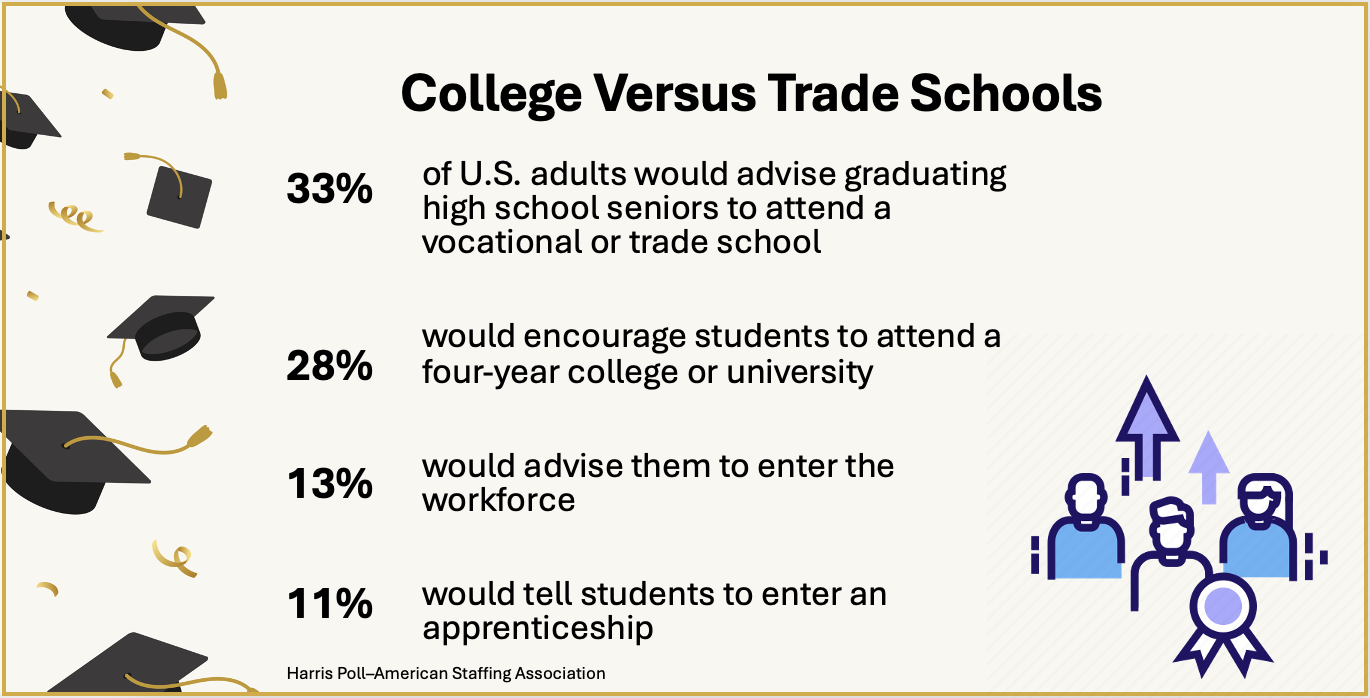
COLLEGE VERSUS TRADE SCHOOLS
A greater percentage of Americans would advise high school graduates to attend a vocational or trade school (33%) rather than a four-year college or university (28%), according to our Harris Poll survey with the American Staffing Association.
- Baby Boomers (41%), Gen X (37%) and Millennials (31%) recommended vocational and trade school career paths.
- Gen Z is the only cohort that recommended a four-year degree (36%) over attending a trade or vocational school (22%).
- A smaller number suggest grads enter the workforce (13%) or find an internship (11%).
- Traditional universities are under the gun: Aside from the campus politics and threatened halt of federal grant money, 80% globally believe that new skills and credentials will be as valued as a traditional university degree by 2035.
- 75% believe AI will disrupt their future career.
THE RISE (AND FALL?) OF ELECTRIC VEHICLES
While interest in electric vehicles has nearly tripled in the past decade, the elimination of tax incentives is affecting purchase consideration, according to our new Harris Poll report.
- 31% of consumers say they are likely to purchase an EV (up from 13% in 2013).
- The top reasons for owning an EV, according to current owners, are having a positive environmental impact (34%), having a 10-year battery warranty (25%) and federal tax credits (21%).
- 24% of consumers who are at least somewhat likely to consider purchasing an EV would strongly reconsider (or no longer consider) making that purchase without the tax incentive.
- 23% of Boomers cite the federal tax credit as a reason for purchasing an EV, compared with 14% of Gen Z/Young Millennials and 18% of total consumers.
TARIFFS HIT RETAIL
The Harris Poll’s Tariff Retail Report highlights Americans’ ongoing economic uncertainty in the wake of months of inflation:
- 72% of Americans are concerned about tariffs (up 11 points since January).
- 66% think the U.S. economy will take years to recover from the tariffs.
- More consumers blame businesses for higher prices (39%) than the government (30%) and personal financial decisions (30%).
- 63% believe companies are taking advantage of the economic climate to boost profits.
SUMMER LIKE IT’S 1999
Americans are nostalgic for ice cream, less screen time and lower prices, according to our Harris Poll survey with Instacart.
- 57% of Americans say the last day of school is among the things they look forward to most during the summer.
- A few of the most appealing elements of the 1990s are the lack of smart phones and social media (53%), the sense of simplicity and nostalgia (39%) and the food and snacks (32%).
- 62% say ice cream reminds them of their childhood summers.
- 64% want their kids to experience the fun summer treats they loved as kids.
- 84% of parents say it’s more important that their kids minimize screen time during the summer.
GAME ON IN CANNES
Stagwell’s SPORT BEACH returns to Cannes next week as the official sport partner of the festival with a powerful lineup of programming at the intersection of sports, creativity and culture.
- This year’s roster of speakers and panelists include tennis icon and trailblazer Serena Williams, sports broadcaster Erin Andrews, long-distance runner and Olympic Gold Medalist Sir Mo Farah, NBA legend Chris Paul, MLB All-Star Alex Rodriguez and George Russell, Mercedes-AMG PETRONAS Formula One Team driver.
- In addition to SPORT BEACH’S daily swim and run clubs, Peloton and select instructors will host engaging fitness experiences throughout the week.
- To register, view the programming calendar, and see the full roster, visit sportbeach.com.
ICYMI: In case you missed it, check out the thought-leadership and happenings around Stagwell making news:
- Father’s Day gifts: 10 brands with high brand equity among dads
- Your Drink Tells Your Age: Keurig Dr Pepper-Harris Poll
- Teachers Sound The Alarm On Literacy: Nemours Children’s Health-Harris Poll
- Companies are preparing for a potential rise in employee turnover
- Fashion Forward: Emerging Trends in Apparel Purchases
Newsletter
Sign Up
Related
Articles
Weekly Data
Jul 10, 2025
WHAT THE DATA SAY: 62% of women say the economy is worsening, versus 47% of men

In the News, Press Releases
Jul 09, 2025
STAGWELL LAUNCHES STAGWELL MEDIA PLATFORM (SMP), A CENTRALIZED TEAM OF GLOBAL MEDIA, TECHNOLOGY AND DATA INVESTMENT EXPERTS

In the News, Investments & Financials, Press Releases
Jul 08, 2025
Stagwell (STGW) Schedules Webcast to Discuss Financial Results for the Three Months Ended June 30, 2025

NEW YORK, June 10, 2025 /PRNewswire/ — Stagwell (NASDAQ: STGW), the challenger network built to transform marketing, today announced the addition of tennis icon and trailblazer Serena Williams to its SPORT BEACH 2025 roster. On the heels of announcing her and her sister Venus’ new podcast with X, Williams will join X CEO Linda Yaccarino on Thursday, June 19 for a fireside chat at SPORT BEACH to discuss her vision for a new model of athlete-entrepreneur.
To register, view the full programming calendar, and see the full roster of leaders, innovators, and cultural influencers joining SPORT BEACH 2025, visit sportbeach.com.
Stagwell invites brands, athletes, sports leagues, media platforms and other interested parties to reach out to sportbeach@stagwellglobal.com to get involved.
About Stagwell
Stagwell is the challenger holding company built to transform marketing. We deliver scaled creative performance for the world’s most ambitious brands, connecting culture-moving creativity with leading-edge technology to harmonize the art and science of marketing. Led by entrepreneurs, our specialists in 45+ countries are unified under a single purpose: to drive effectiveness and improve business results for our clients. Join us at www.stagwellglobal.com.
Contact
Kara Gelber
PR@stagwellglobal.com
Related
Articles
In the News, Investments & Financials, Press Releases, Talent & Awards
Jul 08, 2025
Stagwell (STGW) Advances Executive Team with Four Key Appointments

In the News, Press Releases, Thought Leadership
Jun 10, 2025
Stagwell (STGW) Chairman and CEO Mark Penn to Discuss the Irreplaceable Power of Human Creativity on the Main Stage of Cannes Lions

Events, In the News, Press Releases, Talent & Awards
Jun 05, 2025
Code and Theory Named ANA B2B Agency of the Year After Transforming the World’s Leading Brands

Newsletter
Sign Up
By: Ray Day
CONTACT:
We wanted to share our latest consumer and business insights, based on research from Stagwell. Among the highlights of our weekly consumer sentiment tracking:
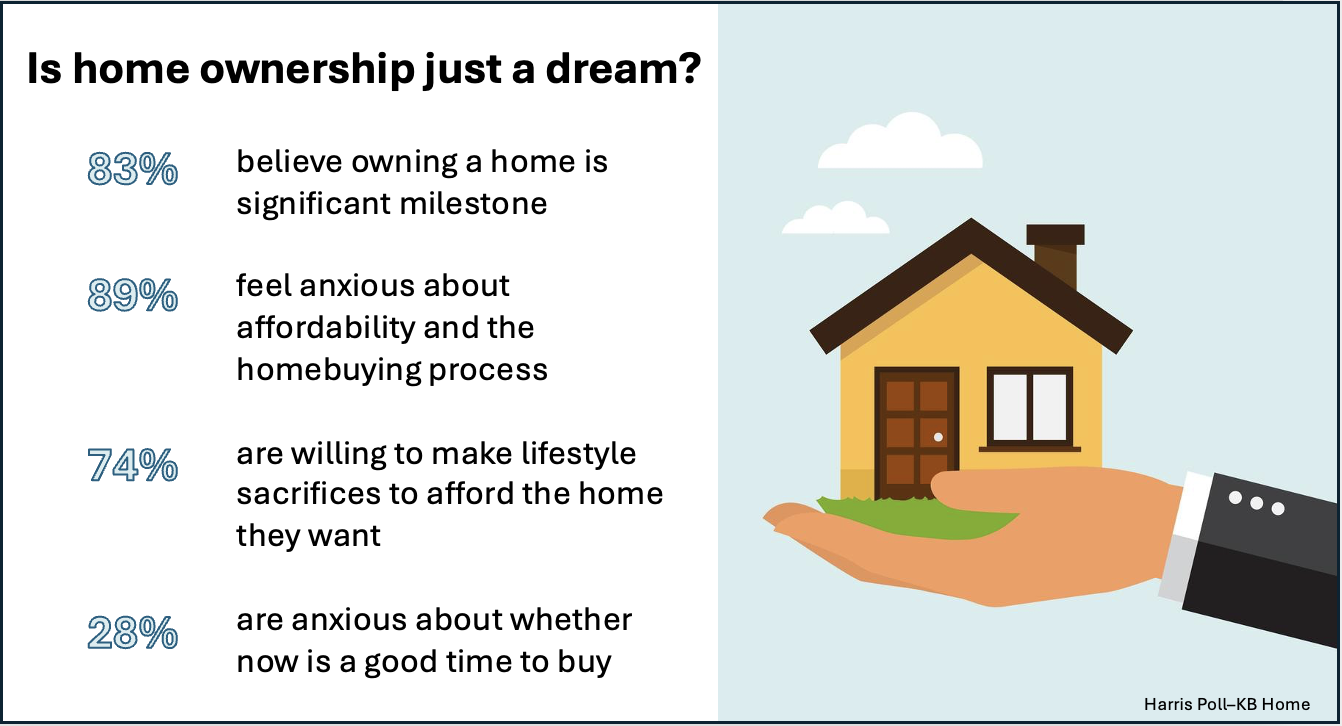
IS HOME OWNERSHIP JUST A DREAM?
Financial anxieties and misconceptions make home ownership feel unattainable to Americans, according to our Harris Poll survey with KB Home.
- 83% of Americans believe owning a home is a significant milestone.
- Excitement (47%), pride (43%) and motivation (28%) are the top emotions associated with homebuying.
- However, 89% feel anxious about affordability and the homebuying process (93% for current renters).
- 74% are willing to make lifestyle sacrifices to afford the home they want.
- 54% believe they are in a worse position to buy a home than previous generations.
- 28% are anxious about whether now is a good time to buy.
- Americans’ top financial anxieties are affording a down payment (45%), knowing how much they can afford (43%), making monthly payments (42%) and finding the best mortgage rate (42%).
- 69% falsely believe mortgage rates are at an all-time high.
- Nearly half don’t know key homebuying terms such as APR (44%) and PMI (49%).
- Gen Z (25%) and Millennials (23%) feel anxious about not knowing where to start in the homebuying process.
FREE WIFI, PLEASE
New York City residents rely on tech companies for accessible Wi-Fi according to our HarrisX research with LinkNYC.
- 55% of New York City residents use free public Wi-Fi monthly.
- 30% rely on it weekly.
- 35% don’t have unlimited cellular data plans.
- 51% run out of data at least one month per year.
- 76% approve of New York City’s use of technology to deliver public services.
- 78% say tech companies have positively impacted the city.
- 71% express interest in expanded, city-wide technology and AI programs.
WOMEN WANT DOULAS
Lack of access to doulas is a critical issue in the maternal health care crisis, according to our Harris Poll research.
- 73% of women believe that insurance companies should provide coverage to employ a doula (81% for women aged 18-34).
- 21% of women who have given birth have used a doula, and 90% found it helpful.
- 19% of women who have given birth wanted to employ a doula but couldn’t.
- 23% say a doula would have improved their pregnancy and birth experience.
- 30% felt they did not have control over their labor and delivery.
- Women ages 18-34 are more likely (51%) to engage a doula than older women ages 35+ (15%).
- Reasons for not employing a doula include lack of education and resources (65%) and financial constraints/lack of insurance coverage (35%).
ICYMI: In case you missed it, check out the thought-leadership and happenings around Stagwell making news:
- PRSA Member Monday Session on Building Reputation Today
- 20 brands catching Baby Boomers’ attention
- Gen Z’s fascination with secondhand apparel: Depop sees large brand equity gains among younger consumers, according to Ad Age – Harris Poll brand tracker
- Organic posts and brand-voice tests: how advertisers are approaching Threads
- From hype to human impact: expanding the role of UX research in the age of AI
Newsletter
Sign Up
Related
Articles
Weekly Data
Jul 10, 2025
WHAT THE DATA SAY: 62% of women say the economy is worsening, versus 47% of men

In the News, Press Releases
Jul 09, 2025
STAGWELL LAUNCHES STAGWELL MEDIA PLATFORM (SMP), A CENTRALIZED TEAM OF GLOBAL MEDIA, TECHNOLOGY AND DATA INVESTMENT EXPERTS

In the News, Investments & Financials, Press Releases
Jul 08, 2025
Stagwell (STGW) Schedules Webcast to Discuss Financial Results for the Three Months Ended June 30, 2025

By: Ray Day
CONTACT:
We wanted to share our latest consumer and business insights, based on research from Stagwell. Among the highlights of our weekly consumer sentiment tracking:
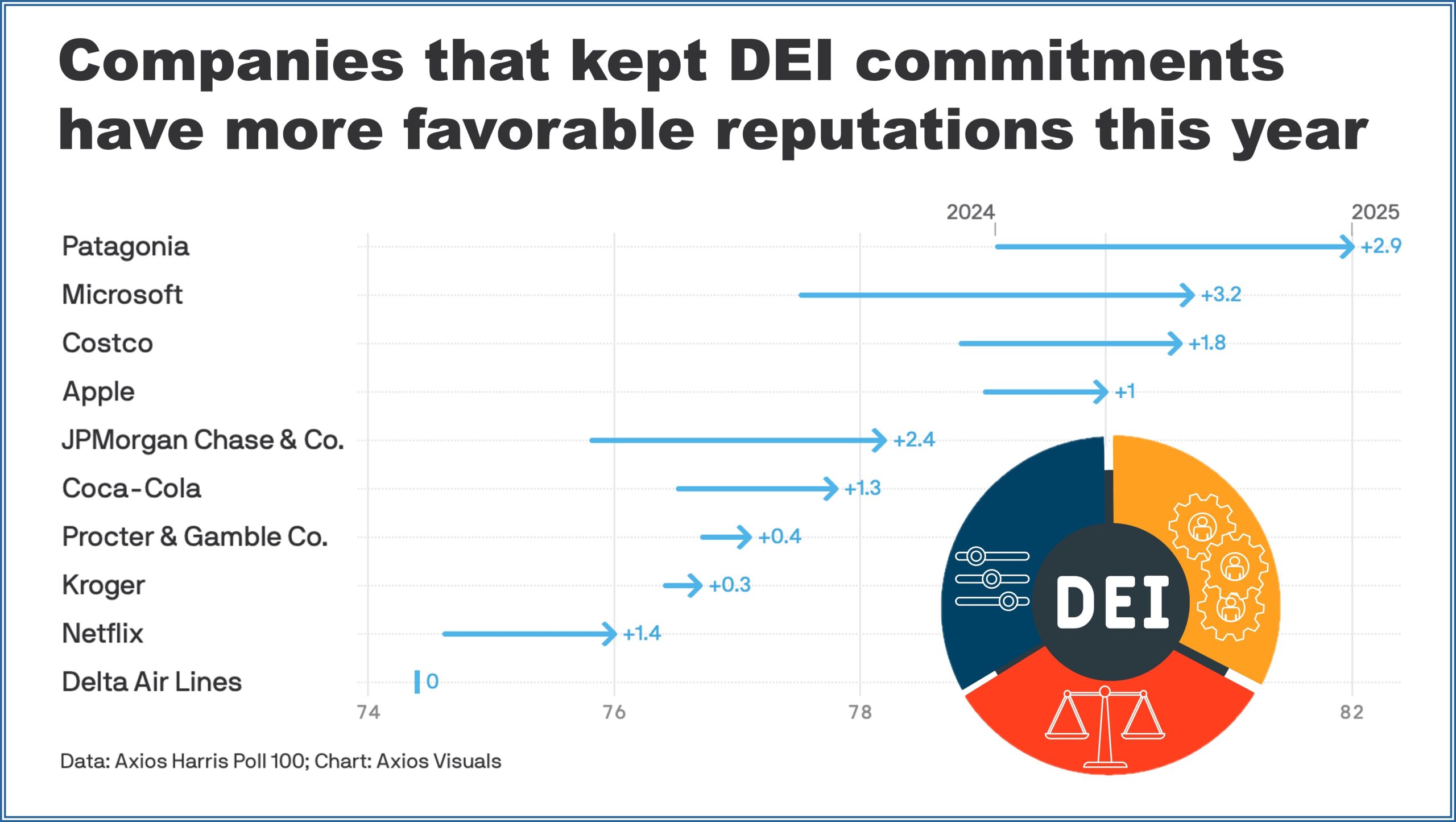
PRICING OVER POLITICS
Americans want businesses to work harder on pricing and less on politics to improve reputations, based the Axios Harris Poll 100 annual reputation study.
- 8 in 10 consumers say they care more about lower prices than politics.
- Two thirds say they aren’t interested in supporting companies that have become too political.
- No. 1 ranked Trader Joe’s, known for affordable specialty foods, registers an excellent reputation score of 82.1 (82.9 among Democrats and 81.1 among Republicans).
- Arizona Beverage Co., known for its giant 99-cent cans of tea, also is among the top 10 in reputation among both political parties.
- The most politically polarizing brands are near the bottom of the top 100 list (SpaceX at rank 86, Tesla at 95, X at 98 and the Trump Organization at 99).
- LEARN MORE: If you and your company/team would like a briefing on this year’s corporate reputation results – including data on many companies that did not make the 100 most visible list – please contact us.
- See also: Companies that kept DEI commitments saw higher reputation scores in 2025
WHAT CONSUMERS WANT
Consumers expect affordable pricing, quality and innovation from brands today, based on our QuestDIY by the Harris Poll survey.
- Affordable pricing (78%) and product quality (72%) are the most important decision factors when choosing a brand.
- 30% of consumers say innovation is an important factor when choosing a brand.
- 54% say it’s important for brands to consistently innovate.
- Consumers expect the newest products from food and beverage brands (36%), followed by restaurants (32%), entertainment products (27%), clothing products (26%) and beauty products (25%).
- 61% would switch to a competitor that offers more innovative products.
TARIFF CONCERNS CONTINUE
Consumers continue to be skeptical of the impact of tariffs on their personal finances and the economy, according to our Harris Poll survey with Bloomberg.
- 56% say their finances would be better if Trump’s tariffs had not been implemented.
- 69% expect higher costs for everyday goods as a result of the tariffs.
- 49% expect the tariffs to be bad for the economy.
- 30% say the levies will be an economic boon.
- Half say the economy is worse than in 2024 (66% of Democrats, 25% of Republicans).
- 3 in 5 report cutting back due to concerns about a recession, including eating out less (70%) and spending less on entertainment (57%).
SUMMER VACATION, AT HOME?
Summer travel sentiments are high, yet financial concerns and foreign policy shifts have affected Americans’ plans, according to our Harris Poll survey with The Points Guy.
- 77% of Americans plan to travel this year (consistent with 76% in February).
- 70% plan to travel domestically, and 28% plan to travel internationally.
- 32% plan to travel more than last year (yet down from 35% in February).
- 34% plan to spend more on travel this year.
- Men (41%) are planning to spend more on travel this year than women (27%).
- 52% say the current economy has affected their travel plans this year.
- 14% have postponed or cancelled travel plans due to the current economy.
- 30% say changing U.S. foreign policy has affected their international travel plans this year.
- See also: Preferred Hotels & Resorts Launches the Luxury Travel Report 2025
GEN Z VS. RETIREMENT
Retiring at age 65 seems like an unattainable goal for Gen Z, based on our Harris Poll survey with Nationwide.
- 44% of Gen Z investors (ages 18-28) feel behind in their retirement savings.
- 38% believe the retirement age of 65 is not relevant in today’s economic environment.
- 48% plan to work longer than age 65.
- 40% are worried about their ability to pay monthly bills over the next year.
- While 77% are concerned about a financial recession in the next year, 40% do not have a strategy in place to protect their assets against market risk.
- 17% are spending more on leisure at this age because they might never be able to retire.
- 62% of financial advisors believe Gen Z is more financially literate than previous generations.
ICYMI: In case you missed it, check out the thought-leadership and happenings around Stagwell making news:
Newsletter
Sign Up
Related
Articles
Weekly Data
Jul 10, 2025
WHAT THE DATA SAY: 62% of women say the economy is worsening, versus 47% of men

In the News, Press Releases
Jul 09, 2025
STAGWELL LAUNCHES STAGWELL MEDIA PLATFORM (SMP), A CENTRALIZED TEAM OF GLOBAL MEDIA, TECHNOLOGY AND DATA INVESTMENT EXPERTS

In the News, Investments & Financials, Press Releases
Jul 08, 2025
Stagwell (STGW) Schedules Webcast to Discuss Financial Results for the Three Months Ended June 30, 2025

By: Ray Day
CONTACT:
We wanted to share our latest consumer and business insights, based on research from Stagwell. Among the highlights of our weekly consumer sentiment tracking:
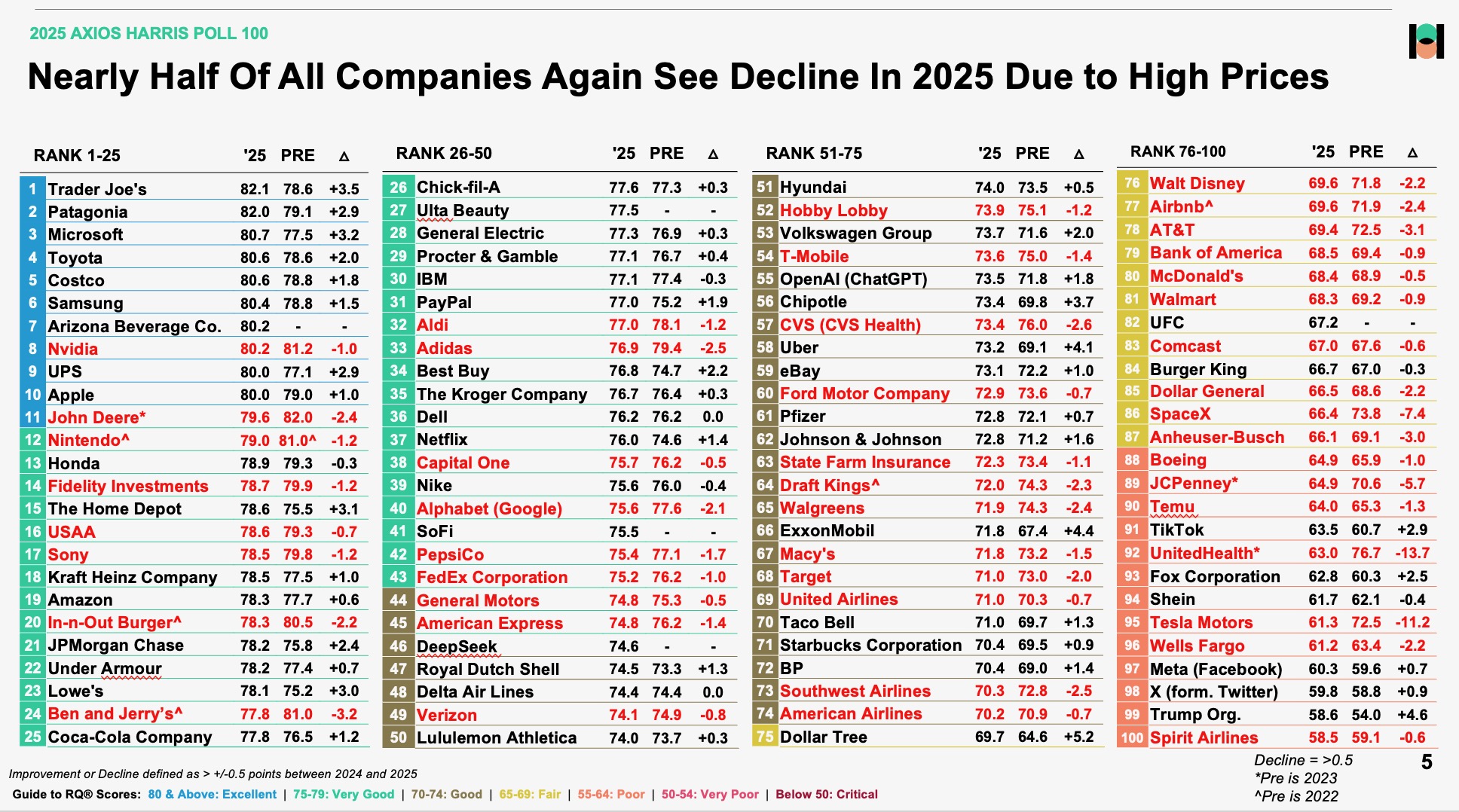
REPUTATION IN DECLINE
Businesses are being blamed for higher prices, and it’s affecting their reputations, according to our 2025 Axios Harris Poll 100 reputation survey.
- 46% of all U.S. corporate reputations declined.
- 40% of Americans say their overall opinion of companies is declining, with most pointing to inflation as the top reason.
- Tesla, SpaceX, UnitedHealth Group and JCPenney saw the sharpest declines.
- Trader Joe’s, Patagonia, Microsoft, Toyota and Costco were among the top five.
- New names to the list include Arizona Beverage Company (#7), Ulta Beauty (#27), SoFi (#41), DeepSeek (#46) and UFC (#82).
- 3M, Subaru and Mattel fell off the list this year.
- 79% of Americans say brands with the best reputation prioritize consumer wallets.
- 77% Americans say companies often sell lower-quality products and services while charging higher prices.
- 70% believe they are taking further advantage of inflation to increase their profit margins.
- 60% feel companies will use tariffs to raise prices more than needed to boost profits.
OPTIMISM GROWS
Americans are feeling more positive about the economy and their personal finances after tariff rollbacks, based on our May Harvard CAPS / Harris Poll.
- 42% say the country is on the right track – up from 39% in April.
- 39% say the economy is on the right track – up from 37% in April and 38% in March.
- 51% say the U.S. economy is strong today (highest since July 2021).
- 39% say their personal finances are getting worse, down from 45% in April.
- Price increases/inflation and the economy/jobs remain the country’s two major issues (34% and 31%).
- 63% support cutting the size of the government.
- 55% say DOGE has been effective.
- 67% (steady with April) support the goal of cutting $1 trillion in expenditures.
DOWNFALL OF TECH INDUSTRY
National Research Group’s new technology report, the Tech Policy Tightrope, examines today’s fragmented tech landscape and predictions for the next few years. Key findings:
- Increased visibility of tech leaders and CEOs carries significant business and reputational risk.
- “Responsible AI” and “competitive AI” are not mutually exclusive as the U.S. explores how to balance ethical development and implementation with complex regulations.
- As policymaking shifts to the states, California, Texas and New York are emerging as key battleground states for AI, privacy and crypto.
- The explosive growth of AI and its impact on the energy grid have made tech policy and energy policy converge.
ANIME ATTRACTING AUDIENCE
Teenage anime fans outnumber Kendrick Lamar fans today, according to our National Research Group report with Crunchyroll.
- 59% of teenagers identify as anime fans, higher than those who identify as Kendrick Lamar fans (48%).
- Teenage fans consider anime to be “meaningful” to who they are (40%) and say it has influenced their outlook on life (30%).
- 78% say anime has strengthened their personal relationships.
ICYMI: In case you missed it, check out the thought-leadership and happenings around Stagwell making news:
- Summer vacation travel: United Airlines boosts purchase intent with a better in-flight experience
- Empowering women in maternity care: Challenging the status quo
- Revisiting ‘Future of News’ one year later: Stagwell investigates news advertising
- Google Marketing Live POV: Reengineering Search for an AI-First World
Newsletter
Sign Up
Related
Articles
Weekly Data
Jul 10, 2025
WHAT THE DATA SAY: 62% of women say the economy is worsening, versus 47% of men

In the News, Press Releases
Jul 09, 2025
STAGWELL LAUNCHES STAGWELL MEDIA PLATFORM (SMP), A CENTRALIZED TEAM OF GLOBAL MEDIA, TECHNOLOGY AND DATA INVESTMENT EXPERTS

In the News, Investments & Financials, Press Releases
Jul 08, 2025
Stagwell (STGW) Schedules Webcast to Discuss Financial Results for the Three Months Ended June 30, 2025

By: Ray Day
CONTACT:
We wanted to share our latest consumer and business insights, based on research from Stagwell. Among the highlights of our weekly consumer sentiment tracking:
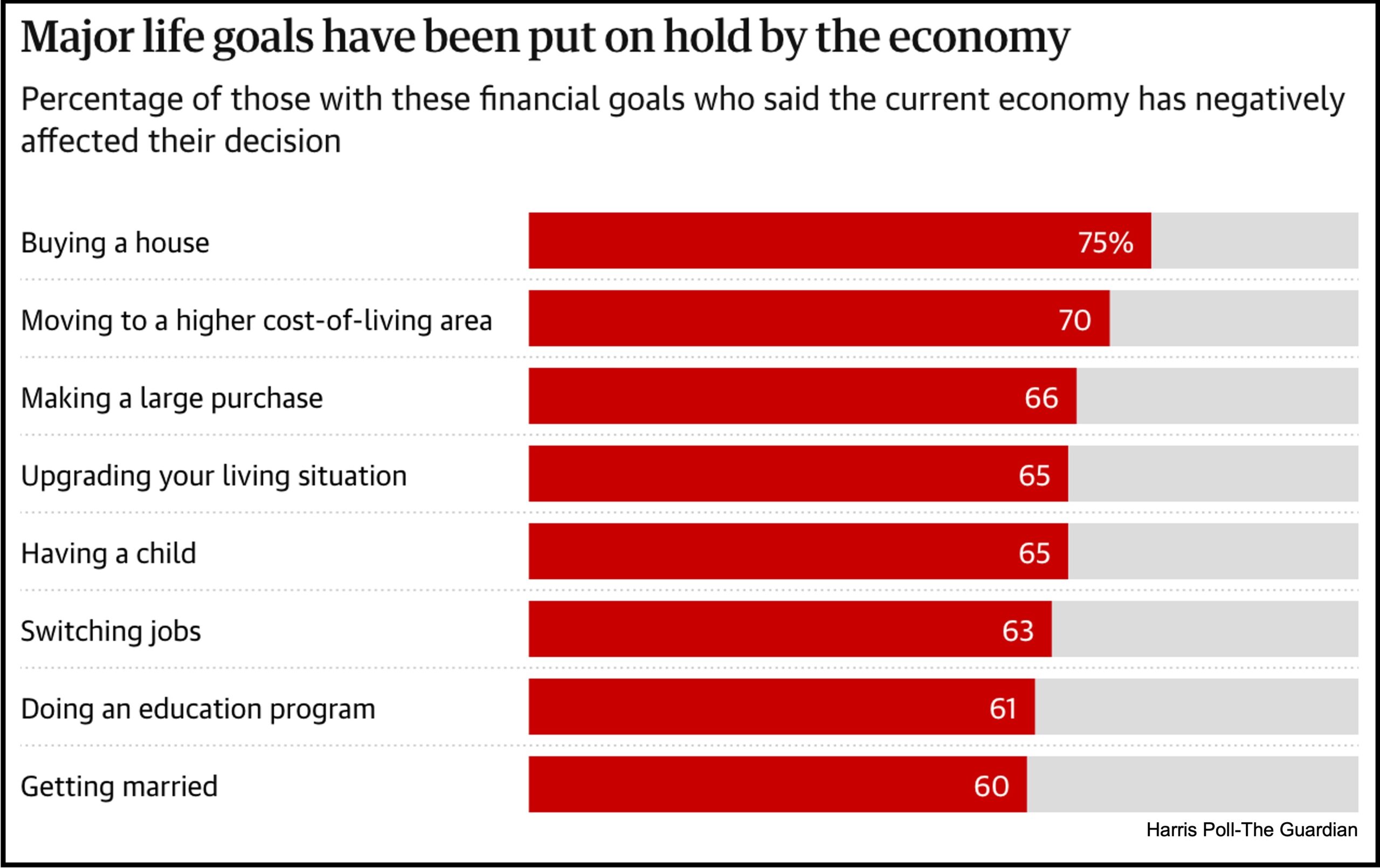
ANXIOUS AMERICANS
Americans are feeling the strain of rising costs, with financial concerns delaying life goals, according to our Harris Poll with The Guardian.
- 65% of Americans think the cost of living has worsened since the start of the year.
- While 33% of Republicans believe the U.S. economy is worsening, 64% of Independents today believe it is worse, more in line with Democrats (73%).
- 29% of Americans – including 39% of Democrats, 28% of Independents and 21% of Republicans – say tariffs will do the most economic harm.
- 78% have noticed higher grocery prices during the last few months.
- 6 in 10 say the economy has affected/delayed at least one major life goal – especially buying a new home (75%), making a large purchase (66%) and switching jobs (63%).
- Of those who planned to have a child in 2025, 32% are unable to afford it, and 33% are uncomfortable having a child in the current economy.
YOUTH SPORTS = GAME CHANGERS
Parents recognize and prioritize the value of youth sports, according to our Harris Poll research with First Tee.
- 88% of parents are making room in their budget for youth activities.
- Most parents say playing sports helps children build confidence and social skills (94%), helps build character (92%) and teaches them important life skills (90%).
- 92% of parents say they have seen firsthand how youth sports can shape a child’s future.
- 91% say the impact of sports lasts a lifetime.
- 67% say they wouldn’t be where they are today without the influence of coaches.
- 69% believe there aren’t enough female coaches or mentors in youth sports.
- 84% hope that their child can participate as a mentor or coach in a youth sports program in the future.
FACTS ON FAST FOOD
Frequent QSR diners value limited-time and seasonal menu items over nutritional value, according to the Harris Poll’s 2025 QSR & Fast Casual Industry Snapshot.
- 57% of U.S. adults order items from a quick service restaurant (QSR) at least once a week.
- 26% order from a QSR at least once a month.
- 31% of frequent diners have gone to a QSR to try a limited-time menu item.
- 18% feel like they are missing out if they see a limited-time menu item they haven’t tried.
- 27% like it when QSRs put a twist on a menu item they already enjoy.
- Frequent diners are most excited about holiday-themed releases (76%), seasonal flavors (74%), trendy food items (70%) and specialty ingredients (68%).
- Quality of food (71%) and price of food (70%) are the most important aspects of dining at a QSR.
- Only 19% cited nutritional value as important.
GEN Z WANTS TO DISCONNECT
Consumers’ desire to interact in-person is changing the retail landscape and their online habits, according to our Harris Poll report with Quad.
- 78% of Americans would rather have an in-person social life than a digital one.
- 81% say digital detoxes should be routine.
- 81% of Gen Z wish it was easier to disconnect from digital devices.
- 84% of Gen Z and Millennials value brands that seamlessly blend technology and physical experiences.
- 76% say physical retail experiences help them connect deeper with people and brands.
- 86% of Gen Z and Millennials say touching and feeling products are essential to their purchase decisions.
- 51% of Gen Z and Millennials are likely to make a return visit after a wow-worthy in-store experience.
- 63% of consumers have planned a trip around visiting a store or brand.
ICYMI: In case you missed it, check out the thought-leadership and happenings around Stagwell making news:
- Health Coverage Is Holding Back More People From Living Abroad
- The Next AI Revolution Isn’t Technical, It’s Emotional
- Stagwell (STGW) Drafts New Picks for SPORT BEACH 2025: Lauren Betts, Myles Garrett, Billie Jean King, Ilona Maher, Brandon Marshall, Katie McCabe, Alex Morgan, Oscar Piastri, Gerard Piqué, Nigel Sylvester, Ian Wright OBE and More Confirmed to Attend
- “Back is Best” for sleeping babies, but not for birthing moms: The critical need for better education on birthing positions
- The vast majority of CEOs are fearful of losing their jobs due to AI, survey reveals
Newsletter
Sign Up
Related
Articles
Weekly Data
Jul 10, 2025
WHAT THE DATA SAY: 62% of women say the economy is worsening, versus 47% of men

In the News, Press Releases
Jul 09, 2025
STAGWELL LAUNCHES STAGWELL MEDIA PLATFORM (SMP), A CENTRALIZED TEAM OF GLOBAL MEDIA, TECHNOLOGY AND DATA INVESTMENT EXPERTS

In the News, Investments & Financials, Press Releases
Jul 08, 2025
Stagwell (STGW) Schedules Webcast to Discuss Financial Results for the Three Months Ended June 30, 2025

